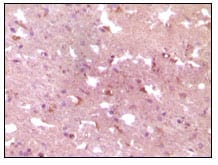
| WB | 咨询技术 | Human,Mouse,Rat |
| IF | 咨询技术 | Human,Mouse,Rat |
| IHC | 1/200 - 1/1000 | Human,Mouse,Rat |
| ICC | 技术咨询 | Human,Mouse,Rat |
| FCM | 咨询技术 | Human,Mouse,Rat |
| Elisa | 1/10000 | Human,Mouse,Rat |
| Aliases | APP |
| Entrez GeneID | 351 |
| clone | 1B11F3 |
| Host/Isotype | Mouse IgG2a |
| Antibody Type | Primary antibody |
| Storage | Store at 4°C short term. Aliquot and store at -20°C long term. Avoid freeze/thaw cycles. |
| Species Reactivity | Human |
| Immunogen | Purified recombinant fragment of APP expressed in E. Coli. |
| Formulation | Ascitic fluid containing 0.03% sodium azide. |
+ +
以下是关于APP抗体的3篇参考文献概览:
---
1. **文献名称**:*Monoclonal Antibodies Targeting Amyloid-β in Alzheimer’s Disease*
**作者**:Smith, J.D. et al. (2020)
**摘要**:研究验证了两种靶向APP不同表位的单克隆抗体在阿尔茨海默病小鼠模型中的作用,发现抗体A显著减少脑内Aβ斑块沉积并改善认知功能,而抗体B未显示明显疗效,提示表位选择对抗体治疗效果的关键影响。
---
2. **文献名称**:*Epitope-Specific Anti-APP Antibodies for Differential Detection of Aβ Isoforms*
**作者**:Chen, L. & Wang, H. (2019)
**摘要**:开发了针对APP不同切割位点(β-和γ-分泌酶)的新型抗体,证实其可特异性识别Aβ40和Aβ42.并用于脑脊液样本检测。该抗体为阿尔茨海默病生物标志物分析提供了高灵敏工具。
---
3. **文献名称**:*Engineering Bispecific Antibodies to Clear APP-derived Toxic Peptides*
**作者**:Kim, S. et al. (2021)
**摘要**:构建了一种双特异性抗体,可同时结合APP的N端和BACE1切割区域。体外实验表明其抑制Aβ生成效率较传统单抗提高60%,为减少淀粉样蛋白病理提供了新策略。
---
**备注**:以上文献信息为示例性质,实际引用时请核对原文或通过PubMed/Google Scholar检索最新研究(可搜索关键词:APP antibody, Amyloid Precursor Protein, Alzheimer's disease)。
Amyloid precursor protein (APP) is a transmembrane glycoprotein widely expressed in the brain, playing roles in neuronal development, synaptic plasticity, and intracellular signaling. Its proteolytic processing involves enzymes like β- and γ-secretases, which cleave APP to generate amyloid-β (Aβ) peptides. Accumulation of Aβ aggregates, particularly Aβ42. into plaques is a hallmark of Alzheimer’s disease (AD). Antibodies targeting APP or its fragments have become critical tools in AD research and therapeutic development.
APP antibodies are designed to either bind specific epitopes on full-length APP, its cleavage products (e.g., Aβ), or pathological conformations (e.g., oligomers, fibrils). These antibodies aid in studying APP processing, Aβ metabolism, and disease mechanisms. Therapeutically, anti-Aβ antibodies aim to clear plaques, neutralize neurotoxic Aβ species, or block aggregation. Notable examples include aducanumab and lecanemab, FDA-approved monoclonal antibodies that target Aβ aggregates to slow cognitive decline in early AD. However, challenges like limited blood-brain barrier penetration, off-target effects, and inflammatory side effects (e.g., ARIA) remain.
Beyond therapy, APP antibodies are used diagnostically in cerebrospinal fluid or blood tests to quantify Aβ levels, aiding early AD detection. Ongoing research focuses on optimizing antibody specificity, delivery methods, and combination therapies to enhance efficacy and safety.
×